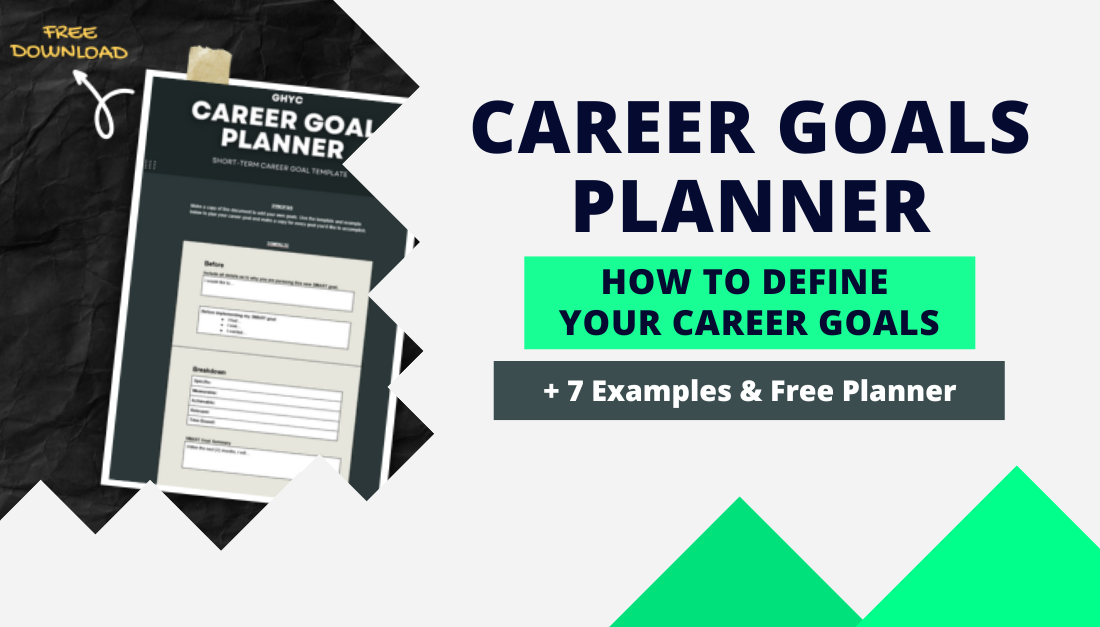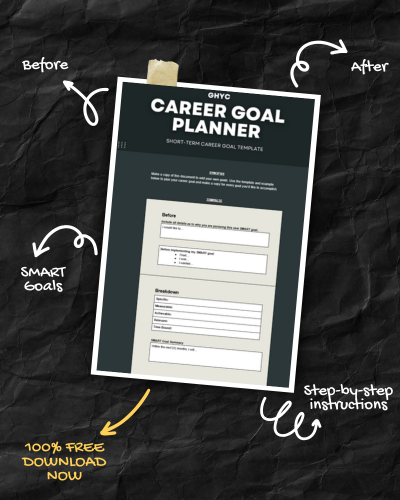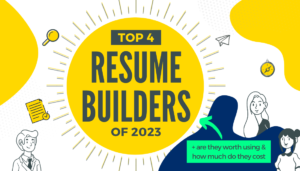
Ultimate Career Goals Planner: How to choose your career goals (+7 examples)
A mentor of mine once said, "you can't climb the ladder of success with your hands in your pockets." I didn't understand it at the time, but after 17+ years and 3 career pivots I feel like I've finally started to understand what he was saying.
👉 If you want to achieve your career goals, you have to get your hands dirty.
It's no secret that actively planning your career goals leads to significantly better outcomes.
Yet, research shows that less than 33% of employees claim they know how to advance their careers in the next five years.
If you have long-term goals, like retiring early, working for a dream company, or achieving work-life balance, setting clear objectives is obviously key.
But here's the thing, thinking about long-term goals can sometimes become debilitating and overwhelming rather insightful.
That's why oftentimes it's better to focus on your short-term career goals first and then adjust as you go along.
👉 In this post I’ll share how to do just that:
- How to think about long-term vs short-term career goals
- A career goal-setting template (with instructions)
- Examples of popular short-term career goals for your reference
- Tips and resources to take your first step toward your goals.
Let's dive in!

How to Set "Smart" Career Goals
Planning your career goals can feel overwhelming.
With so many factors to consider, it's easy to get lost in the process and end up setting unclear or disorganized goals.
You’ve probably heard of the S.M.A.R.T. goals framework, which is a proven method for setting clear and effective objectives.
Here's a quick refresher on what the acronym stands for:
S - Specific: Your goal should be clear and focused, addressing exactly what you want to achieve.
M - Measurable: There should be clear criteria to track your progress and determine when the goal is accomplished.
A - Achievable: The goal should be realistic, considering the resources and constraints you have.
R - Relevant: The goal should align with your broader objectives and career or life aspirations.
T - Time-Bound: There should be a set deadline or timeframe for accomplishing the goal.
By following the S.M.A.R.T. framework, you can transform your career goals from overwhelming ideas into actionable steps (more on that below).
Here’s an example and a template to help guide you through your goal-setting.

SMART Goals Template (for you!)
This SMART goals template is designed to help you define you career goals, with a unique twist.
Unlike typical templates, it includes both a “before” and “after” section, giving you a clear path to define and achieve your career goals.
BEFORE
The before section helps you reflect on your current situation, identify where you stand, and pinpoint any gaps. The insights from this will make it easier to clarify and refine your career goals.
AFTER
The after section serves as a powerful motivator and reflection tool. It allows you to visualize the impact of your career goals and track your progress along the way (super important!). This section ensures you're always aligned with your long-term career objectives as well.
Feel free to make a copy of this template and use it as you define your goals.
Think you might be missing some skills to achieve your new career goal? Watch this video by Career Coach, Rebecca Joy Tromness, on how to overcome skills gaps.
Example SMART Career Goals
If you’ve never made a SMART goal before, there are a lot of ways you can approach it. Here’s an example of a SMART goal that our Blog Editor, Rara Watanabe, set for herself when she wanted to further develop her career. 👇
- I had limited experience in marketing.
- I was interested in exploring other areas of marketing.
- I wanted to build my resume to have more experience.
Breakdown:
Specific: Complete an online certification course in digital marketing.
Measurable: Spend at least 5 hours per week on coursework.
Achievable: The course is manageable within the given time frame.
Relevant: The certification is aligned with career growth in the marketing field.
Time-Bound: Complete the course within 2 months.
SMART Goal Summary: Within the next three months, I will complete an online certification course in SEO strategy, spending at least 5 hours per week on coursework, to enhance my experience and skills to qualify for more job opportunities in the marketing field.
After completing my SMART goals: I gained a valuable skill set that I’m now using in my role as a content writer at Growth Hack Your Career. It’s also helped me enhance my resume—I've had several hiring managers point out my SEO certification!

7 Career Goal Examples
Of course everyone’s career goals are unique. If you're having a hard time getting some career goal ideas, this list of short-term career goals can help you get started.
Use these examples and tailor them to your unique story to create career goals that align with your values, passion, and purpose.
1. Find a New Job
Finding a new job can feel like a long-term goal, but it’s a fantastic short-term career goal too. It opens doors to new opportunities that better match your skills, interests, and long-term ambitions. Plus, it offers the chance to grow professionally, expand your network, and gain fresh experiences in a new work environment.
Short-term career goals you can get started with today!
- Reach out to 1 potential employer per week to establish connections and increase your chances of landing an interview.
- Apply to at least 3-5 jobs per week to stay consistent with your job search.
Here's an article on the magic number of job applications for each stage of your job search.
2. Improve Performance
Identify a key metric to focus on based on your role—whether it’s meeting deadlines, sticking to budgets, or completing tasks more efficiently.
3 Short-term career goals you can use for improving performance:
- Enhance Communication: Ask for feedback from your boss or coworkers on your strengths and areas to improve. Schedule check-ins every one or two months to track your progress and stay on track.
- Boost Time Management: Try using the Pomodoro Technique—work in focused 25-minute intervals with 5-minute breaks. Stick with it for three months and see how it improves your productivity
- Set a Performance Goal: Start by selecting a specific metric you want to improve in your work. Tailor it to your unique role and set a goal to boost that performance over a short period, such as one to two months.
3. Negotiate a Higher Salary
Speaking of performance, if you've already been performing well at your job, it may be time to start negotiating for that higher salary. Most salary raises occur within 1-3 years on the job, so this is a great career goal to add to your list.
Of course, salary negotiation can sometimes feel daunting. Here are two videos that can help. The first is from Career Coach Jean Kang, on how to approach your salary negotation. The second video is from Negotiation Expert Christina Hepburn on the 5 negotiation styles you're likely to encounter.
4. Learn a new skill
Learning new skills, whether through certifications, courses, or a degree, can significantly enhance your expertise and give you a competitive advantage in your desired role.
How to get started:
Complete an online course to learn a new skill, dedicating at least 4 hours per week to the course material. The goal is to finish the course and gain certification within a short time frame to enhance your professional abilities.
Some great websites to explore for certifications include:
5. Build Your Professional Network
How to get started:
- Start small! Aim to connect with 3 professionals over the next 3 months to gradually expand your network.
- Attend at least 2 networking events or webinars in the next 3 months to connect with potential mentors and learn more about your industry of choice!
Here are 3 LinkedIn message templates to help you connect with your industry professionals
6. Update Your Resume
Updating your resume or portfolio is essential when job hunting, but it’s also a great opportunity to reflect on your career goals. While editing, take time to assess whether your past and current experiences align with where you want to go in the future.
How to get started:
- Identify at least 3 key skills or qualifications you are missing for your desired career. Over the next 6 weeks, focus on improving one of these skills each week to strengthen your qualifications.
- Update your resume or portfolio to reflect your latest accomplishments and skills within the next month.
Remember, you don't have to build your resume manually these days. Here are the 5 resume builders to create your resume faster.
7. Find a Mentor
Building a professional network includes forming relationships with experienced individuals in your desired career field. A mentor can provide valuable guidance, help you navigate your career journey, and expand your network.
How to get started:
- Aim to find one mentor within the next three months. Take the time to ensure they are the right fit for your career goals and aspirations.
- I will attend at least two networking events or webinars in the next three months to connect with potential mentors, tracking the number of meaningful connections made.
Mentorship platforms to explore:
- MentorCruise – Paid mentorship opportunities with top experts in various industries.
- ADPList – Connects individuals with mentors in different fields, offering free mentorship opportunities.
- PushFar – A networking platform that helps professionals connect, collaborate, and grow through personalized mentoring, events, and career development opportunities.
By using frameworks like S.M.A.R.T. goals and regularly reassessing your progress, you can stay on track and adapt your plans as necessary.
Remember, career development is a continuous journey—small, achievable goals can lead to significant milestones, and with the right mindset and strategy, you'll be well on your way to accomplishing your dreams.
Start today by reflecting on your aspirations, creating your goals, and taking that crucial first step toward a brighter, more successful career.
And, if you need a bit of extra guidance, remember you can get all of our FREE videos and courses by dropping your name and email below!
Read more resume, LinkedIn, and interview best practices on The GHYC Blog.
More from the blog:
Good Weakness for Interview: How to Craft the Perfect Answer (+10 Examples)
Good Weakness for Interview: How to Craft the Perfect Answer (+10 Examples)One of the biggest...
Top 9 Questions for Second Interviews: What to expect & how to answer
Top 9 Questions for Second Interviews: What to expect and how to answer Congratulations! 🎉 If...
The Ultimate Guide to Interview Prep: strategies, scripts, & questions
The Ultimate Guide: How to Prepare for an Interview (scripts, strategies, & more!) “If you try...
Like this? Try our free courses!
Tired of sending your job applications into a black hole and never hearing back? Get hired faster with our guided courses all for FREE!
Rara Watanabe is a writer with a background in marketing, sales coordination, and community engagement. With a BA in International Relations and a minor in Literature and Writing from UC San Diego, she has developed expertise in content creation, market research, and marketing in both corporate and non-profit spaces.

